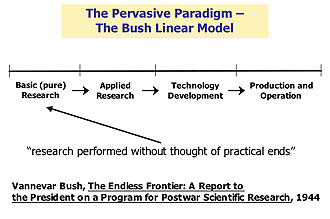|
|
So, the research that went on right at the end of the Second World War and the early 1950s—a lot of it actually in industrial laboratories, Bell Telephone Laboratories in particular—brought the invention of the transistor. The invention of the transistor then went into an applied view of trying to develop transistor systems into integrated circuits, which then drove technological development of the circuits as chips, integrated chips, and computational devices and ultimately led to the computer industry and the information technology age that we now live in. That's what this linear view, starting from three sprockets of guys who were in the lab with suits and ties on. I love those photos from the '40s—three guys looking over the top of this thing with wires sticking out of it—and now the modern information age totally dominates our day-to-day lives with the little things that are on your table right here.
This linear model is all based on the idea that the first stage of this, the initiation of this entire process, is research performed “without thought”—love that phrase—of practical ends. The way it got rephrased in the '50s and '60s, and especially with the molecular biology revolution in the '60s and in the '70s with recombinant technologies, has been that “without thought of practical ends” is curiosity-driven. Right? I got an idea. I'm just going to follow that curiosity, and I'm going to discover what's going on.
This one-dimensional view of the world really dominated the thought, the approach to science, and also the funding mechanisms.
|
|

 |
The whole Defense Department “6.1, 6.2, 6.3.1.2” system is based on this linearly derived view of the way in which research proceeds and the way it affects commercialization and the economy. Who participates? Again, in this one-dimensional view, the start is always with university researchers. I find it interesting when this is proposed because I've heard this talk in the negative, the way I'm doing it now, as this is the way the world works, is they always say, oh, the university researchers, (unintelligible) sit in the back and raise my hand to the first question and said, “So what's one of the biggest revolutions?” |
>
01 02 03 04 05 06 07 08 09 10 11 12 13 14 15 16 17 18 19
|
